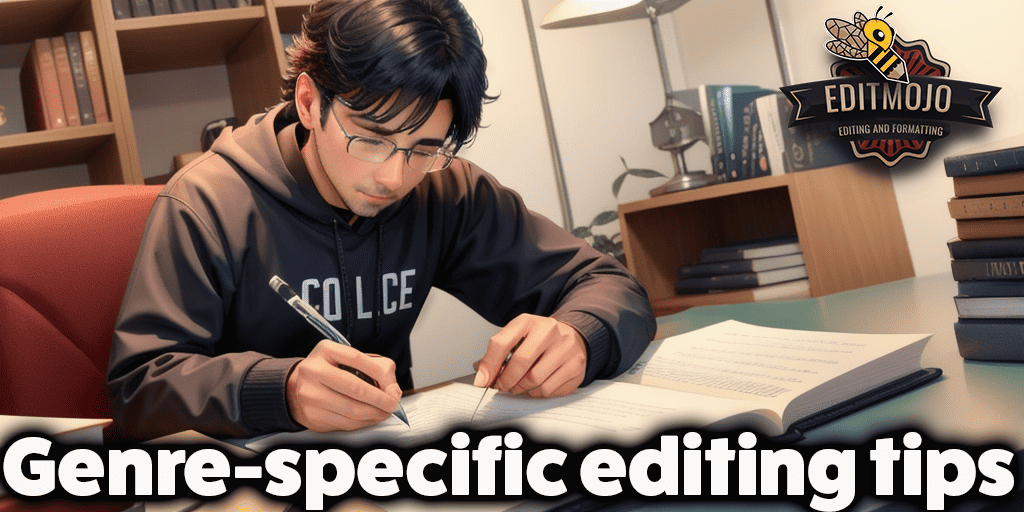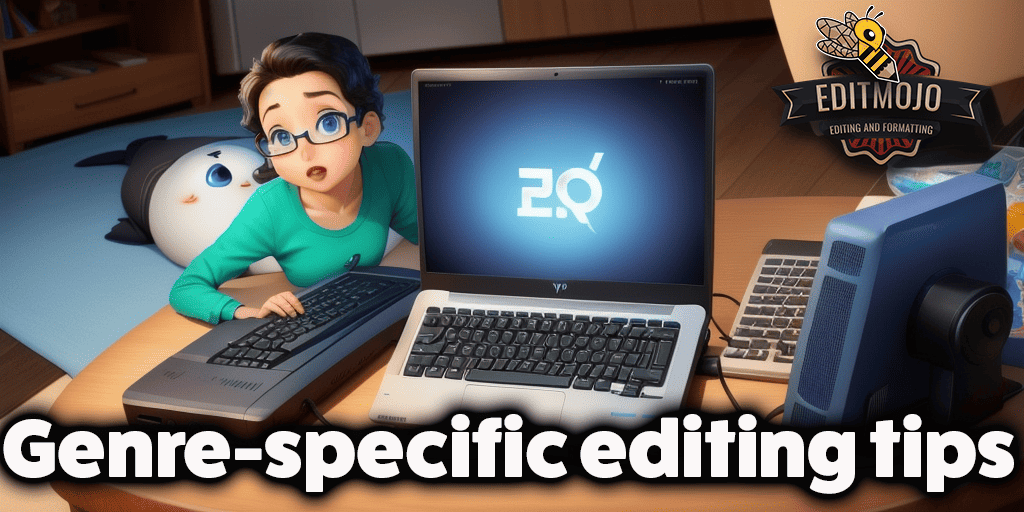Genre-Specific Editing Tips
Genre-specific editing tips. When it comes to editing, one size does not fit all. Different genres require different approaches, and a keen understanding of the specific demands of your chosen genre can make all the difference. In this blog post, we’ll delve into genre-specific editing tips to ensure your work shines, no matter the category. Whether you’re writing a thrilling mystery or a heartwarming romance, these tips will help you elevate your craft to the next level.
1. Mystery and Thriller
Intrigue and suspense are the backbone of any good mystery or thriller. Here are some editing tips to keep your readers on the edge of their seats:
- Pace: Ensure your story moves at a brisk pace, with no unnecessary lulls. Maintain tension by varying your sentence structure.
- Clues: Scatter clues and red herrings throughout your narrative, but make sure they are neither too obvious nor too obscure.
- Characterization: Develop strong, believable characters with distinct motivations. Remember, even the most engaging plot can fall flat without well-rounded characters.
- Twists: Keep readers guessing by employing unexpected twists. However, ensure these twists are plausible and well-supported by the story’s internal logic.

2. Romance
Romance relies on emotional connection and character development. Here’s how to make your love story swoon-worthy:
- Emotional Depth: Create emotionally rich characters, and don’t shy away from exploring their vulnerabilities.
- Conflict: Introduce believable conflict to test your characters’ relationship, but avoid overused tropes or contrived misunderstandings.
- Dialogue: Craft natural, engaging dialogue that showcases your characters’ personalities and the chemistry between them.
- Resolution: Ensure a satisfying resolution that stays true to your characters and their journey, whether it’s a happy ending or a poignant, bittersweet conclusion.
3. Science Fiction and Fantasy
World-building is key when editing sci-fi and fantasy manuscripts. Keep these tips in mind to bring your fictional universe to life:
- Consistency: Establish a clear set of rules for your world and adhere to them consistently. Inconsistencies can break the reader’s immersion.
- Description: Use vivid, concise descriptions to paint a picture of your setting, but don’t overwhelm readers with unnecessary details.
- Character Development: Develop rich, multi-dimensional characters that engage readers, even in the most fantastical settings.
- Themes: Explore thought-provoking themes and ideas that resonate with readers, making your story not only entertaining but also intellectually stimulating.

4. Historical Fiction
Accuracy and authenticity are crucial in historical fiction. Follow these editing tips to transport readers to another time and place:
- Research: Conduct thorough research to accurately portray the historical period and avoid anachronisms.
- Dialogue: Strike a balance between historical authenticity and readability. Modernize your dialogue enough to be accessible, but retain the flavor of the period.
- Setting: Immerse readers in the time period through vivid descriptions of settings, customs, and social norms.
- Historical Figures: If you include real historical figures, treat them with care, ensuring they are well-researched and accurately portrayed.
5. Non-Fiction
- Non-fiction requires a balance of factual accuracy and engaging storytelling. Here are some editing tips to help your non-fiction work resonate with readers:
- Fact-Checking: Ensure every assertion, quote, or data point is thoroughly fact-checked. Credibility is paramount in non-fiction writing.
- Structure: Organize your content logically and coherently. Use headings, subheadings, and bullet points for clarity.
- Voice: Maintain a consistent, engaging voice that connects with readers. Whether you’re writing a self-help book or a historical account, your voice can make or break the reader’s experience.
- Sources: Cite your sources properly to maintain transparency and avoid plagiarism.
6. Youn Adult (YA) Fiction
- Young Adult fiction addresses the unique experiences and challenges of adolescence. Here are some tips to ensure your YA novel resonates with its intended audience:
- Authenticity: Write authentically about the teenage experience. Avoid condescension or stereotypes.
- Voice: Create a strong narrative voice that speaks to your audience. Avoid dated slang or attempts to ‘sound young’ that may come off as inauthentic.
- Characterization: Develop relatable, complex characters. Remember, YA readers value characters who mirror their own experiences and emotions.
- Themes: Explore themes that are relevant to your audience, such as identity, friendship, love, and the transition to adulthood.

Conclusion
- Editing is a nuanced process, and tailoring your approach to the genre can greatly enhance the quality of your work. Whether you’re writing a gripping thriller, a sweeping fantasy epic, or an insightful non-fiction book, these genre-specific editing tips should help you polish your manuscript to perfection.
- Remember, the key to successful editing lies in understanding your genre’s conventions, meeting your audience’s expectations, and bringing your unique vision to life. Happy editing!
